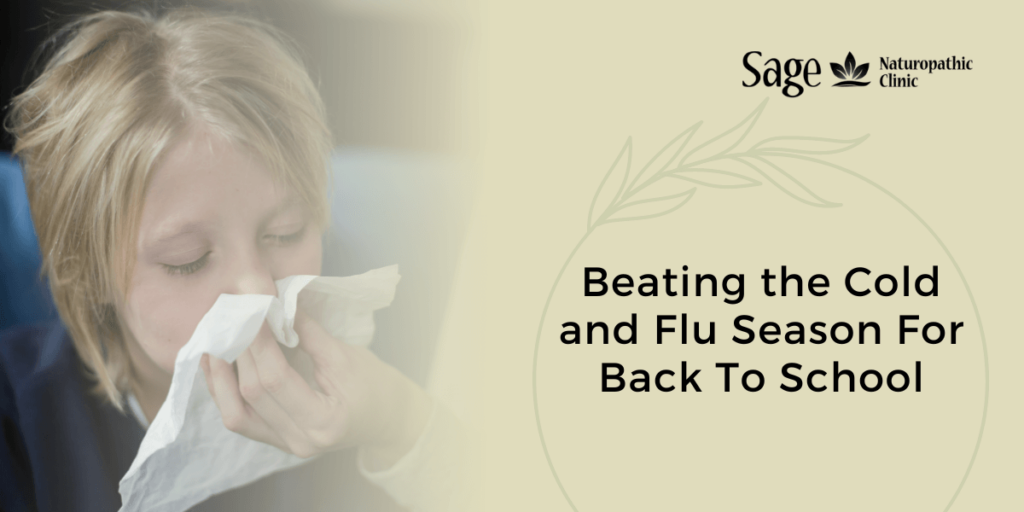
As the temperature begins to fall, many people find themselves feeling less than their best. Fall and Winter can be a challenging time of year with cold and flu season at its peak. Regardless of whether or not you decide to vaccinate against the flu, naturopathic medicine can help you ensure that your immune system is working at its best. This will help protect you and your loved ones from the cold and seasonal flu.
Some of the most important things you can do to boost your immunity this season and ensure your family’s health are:
1. Wash your hands: We have all heard this over and over. That’s because it is one of the most important things you can do to avoid transmitting germs. It is also important to avoid touching your eyes, nose or mouth with your hands as this can encourage the spread of viruses and bacteria. Encourage your children to wash their hands often and especially when they get home after school.
2. Get a bottle of sunshine: Vitamin D supplementation is particularly important for those of us living in North America. With shorter days and longer nights, we don’t get enough sun exposure, which in turn means we don’t produce enough Vitamin D. This vitamin is typically known for its effect on bone development and calcium absorption. But in recent years, it is getting more attention for its effect on the immune system. Many studies have shown that individuals with decreased serum levels of Vitamin D are at an increased risk of developing a cold or flu.
3. Eat a colorful diet: Different colored foods have different phytonutrients. Phytonutrients are chemicals that are present in fruits and vegetables and other foods like whole grains and legumes. Making sure you get a variety of different colored foods in your diet will ensure that you get a wide variety of phytonutrients to support your body’s immune system and stay well. These foods also contain vitamins, minerals and fiber, which are added benefits to ensure optimum health. Make it fun for you kids by telling them that you are going to try to eat all the colours of the rainbow. Look at their lunches. If it’s all crackers and bread, add some colour with different sweet peppers, carrots, blueberries, avacados and cucumbers. Get them involved by helping you pick out the colours of the day.
4. Cut out the sugar: The Standard Canadian Diet is high in fat, low in fiber and high in processed foods. It is also particularly high in sugar. If you want to avoid getting sick, reduce your sugar intake and check your labels carefully. Many foods disguise sugar by using alternative names like sucrose, fructose and maltose, just to name a few. Sugar is an immune depressant. When white blood cells are exposed to high levels of sugar in the bloodstream, they show a decreased resistance to infection. If you must, use natural sweeteners like honey, agave and xylitol but use them sparingly. Especially avoid sugar in lunch boxes as this will make your child more susceptible to infections at school.
5. Not all bugs are bad: Probiotics are the healthy and necessary bacteria that hang out in your gut. These little guys are your body’s natural defense against infections. Many people have an imbalance in their guts due to overuse of antibiotics, poor diet and stress. Supplementation has shown to decrease the incidence of both gastrointestinal and respiratory infections. You can also get probiotics from fermented foods like yogurt and kefir, but at this time of year, it is best to supplement to ensure that you get adequate amounts.
6. Get moving: Exercise in moderation has been shown to increase immune cell function. However, too much of a good thing is not necessarily better. Intense or prolonged exercise actually decreases your immune response.
7. Get some ZZZZ’s: Not getting enough sleep has been shown to reduce the body’s resistance to infection. According to a study conducted by the Archives of Internal Medicine, people “who slept an average of fewer than seven hours a night … were three times as likely to get sick as those who averaged at least eight hours.”
8. Manage your stress: The Mind-Body connection cannot be overlooked. Stress has a very powerful effect on your body. Although acute stress can boost immunity, chronic, unrelenting stress suppresses the immune reaction leaving you vulnerable to infection. Combat the negative effects of stress with some good relaxation techniques like deep breathing, guided visualization and meditation. Children are not immune to stress either. If you child is getting sick often, perhaps he/she is overscheduled or has some anxiety. Watch your little one carefully and make lifestyle adjustments accordingly.